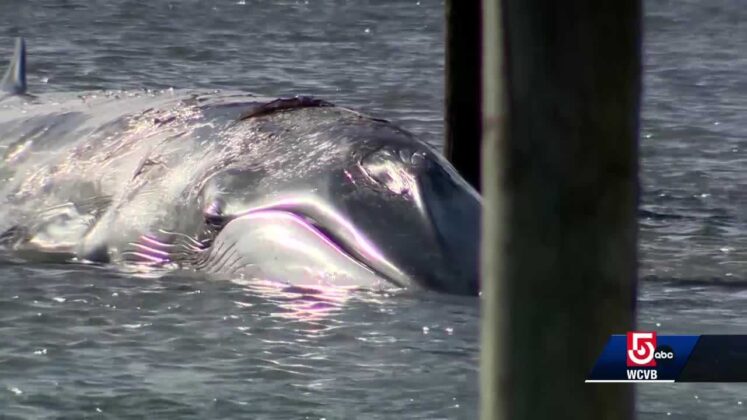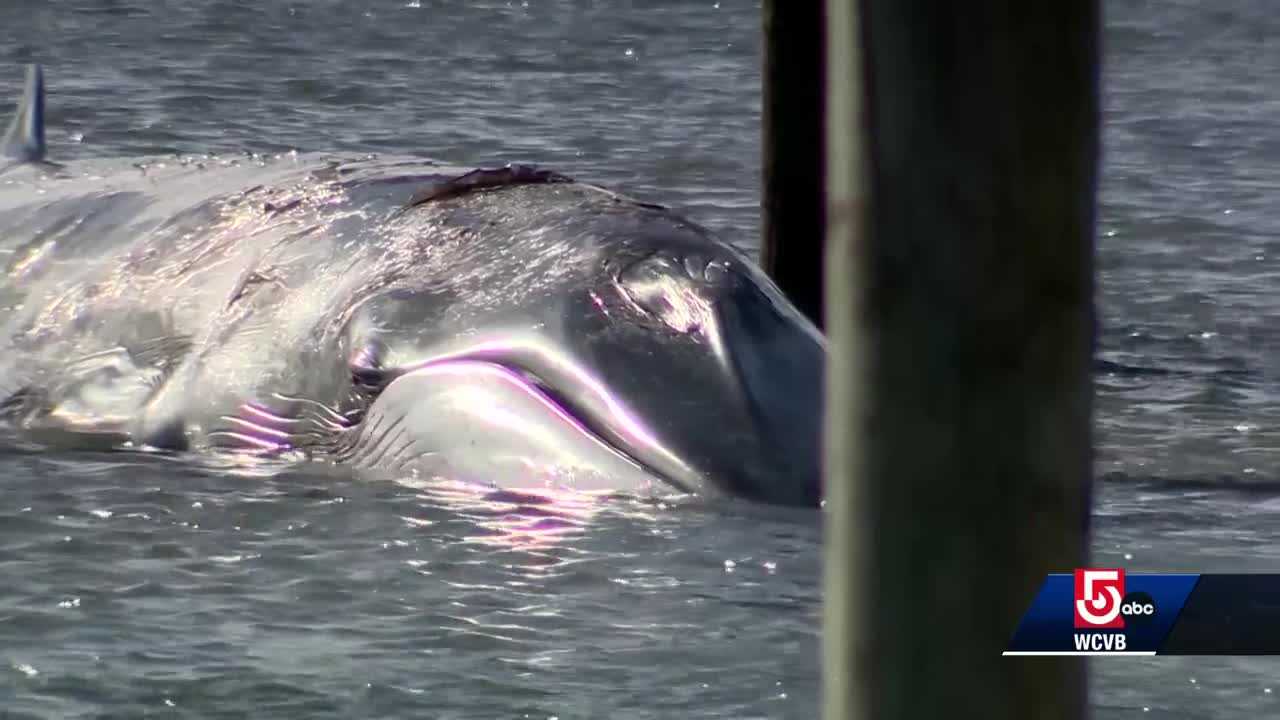No products in the cart.

30-foot long whale strands in salt marsh along New England coast

Officials in Rhode Island are evaluating a whale that was stranded Thursday in a salt marsh along the state’s south coast. Staff from Mystic Aquarium and the Rhode Island Department of Environmental Management responded after the whale, possibly a juvenile fin whale, was spotted at about 6 a.m. in the shallows of Snug Harbor near Succotash Marsh in South Kingstown. “Just outside the edge of these docks, there’s a little channel, but it’s not very deep. It’s very, very narrow. So where that whale is, it’s shallow, maybe three feet deep,” one resident said. It’s not clear how the whale wound up in the shallows, but it could have been swept in during high tide overnight.”When the tide is coming in and out, it’s a very, very strong current,” another resident said.The whale, estimated to be about 30 feet long and 25,000 pounds, is alive, officials said. From Sky5 and from shore, the animal could be seen breathing and moving its fins, but its movements grew visibly more labored as the day went on. The animal shows no signs of obvious injury like a vessel strike or fishing gear entanglement, but it is thin, weak and in poor condition, officials said. “The animal is in very thin body conditions, so a very compromised animal. And it’s in a really tricky location,” Sarah Callan of the Mystic Aquarium said.Officials plan to monitor the animal in hopes it will free itself from the marsh at high tide, something it was unable to do during Thursday’s earlier high tide. “The tide wasn’t as high as we were hoping the water level would be. The wind prevented that, so the weather conditions aren’t really on the animals’ side either, right now,” Callan said.If it is incapable of doing this, the team will evaluate additional options, officials said. “The animal’s welfare is really the priority here. And we don’t want an animal who’s really sick to be suffering very long,” Callan said. The public is being kept a distance away to lessen the stress on the already ailing animal, officials said.According to the National Oceanic and Atmospheric Administration, fin whales are the second-largest whale species on earth, second to the blue whale. Fin whales are listed as endangered and are found throughout the world’s oceans. The animal gets its name from a distinctive, easy-to-spot fin on its back near its tail.Sky5: Fin whale strands in Rhode Island salt marsh
SOUTH KINGSTOWN, R.I. —
Officials in Rhode Island are evaluating a whale that was stranded Thursday in a salt marsh along the state’s south coast.
Staff from Mystic Aquarium and the Rhode Island Department of Environmental Management responded after the whale, possibly a juvenile fin whale, was spotted at about 6 a.m. in the shallows of Snug Harbor near Succotash Marsh in South Kingstown.
Advertisement
“Just outside the edge of these docks, there’s a little channel, but it’s not very deep. It’s very, very narrow. So where that whale is, it’s shallow, maybe three feet deep,” one resident said.
It’s not clear how the whale wound up in the shallows, but it could have been swept in during high tide overnight.
“When the tide is coming in and out, it’s a very, very strong current,” another resident said.
The whale, estimated to be about 30 feet long and 25,000 pounds, is alive, officials said. From Sky5 and from shore, the animal could be seen breathing and moving its fins, but its movements grew visibly more labored as the day went on.
The animal shows no signs of obvious injury like a vessel strike or fishing gear entanglement, but it is thin, weak and in poor condition, officials said.
“The animal is in very thin body conditions, so a very compromised animal. And it’s in a really tricky location,” Sarah Callan of the Mystic Aquarium said.
Officials plan to monitor the animal in hopes it will free itself from the marsh at high tide, something it was unable to do during Thursday’s earlier high tide.
“The tide wasn’t as high as we were hoping the water level would be. The wind prevented that, so the weather conditions aren’t really on the animals’ side either, right now,” Callan said.
If it is incapable of doing this, the team will evaluate additional options, officials said.
“The animal’s welfare is really the priority here. And we don’t want an animal who’s really sick to be suffering very long,” Callan said.
The public is being kept a distance away to lessen the stress on the already ailing animal, officials said.
According to the National Oceanic and Atmospheric Administration, fin whales are the second-largest whale species on earth, second to the blue whale. Fin whales are listed as endangered and are found throughout the world’s oceans. The animal gets its name from a distinctive, easy-to-spot fin on its back near its tail.
Sky5: Fin whale strands in Rhode Island salt marsh




